58% of Jewish Israelis; 71% of Arab Israelis think Israel's Security is a Key Consideration for President Trump
58% of Jews and 71% of Arabs think Israel's security is a key consideration for President Trump. A majority of Jews (60%) think that Israel has achieved most or all of its goals, while only 37% of Arabs concur. A plurality of Jews are optimistic that a deal to end the war in Gaza will be reached soon (50%) and that there is a high likelihood of a regional peace process beginning (48%). Among Arabs, a plurality think there is a LOW likelihood of both scenarios (49% Gaza / 45% regional peace process).
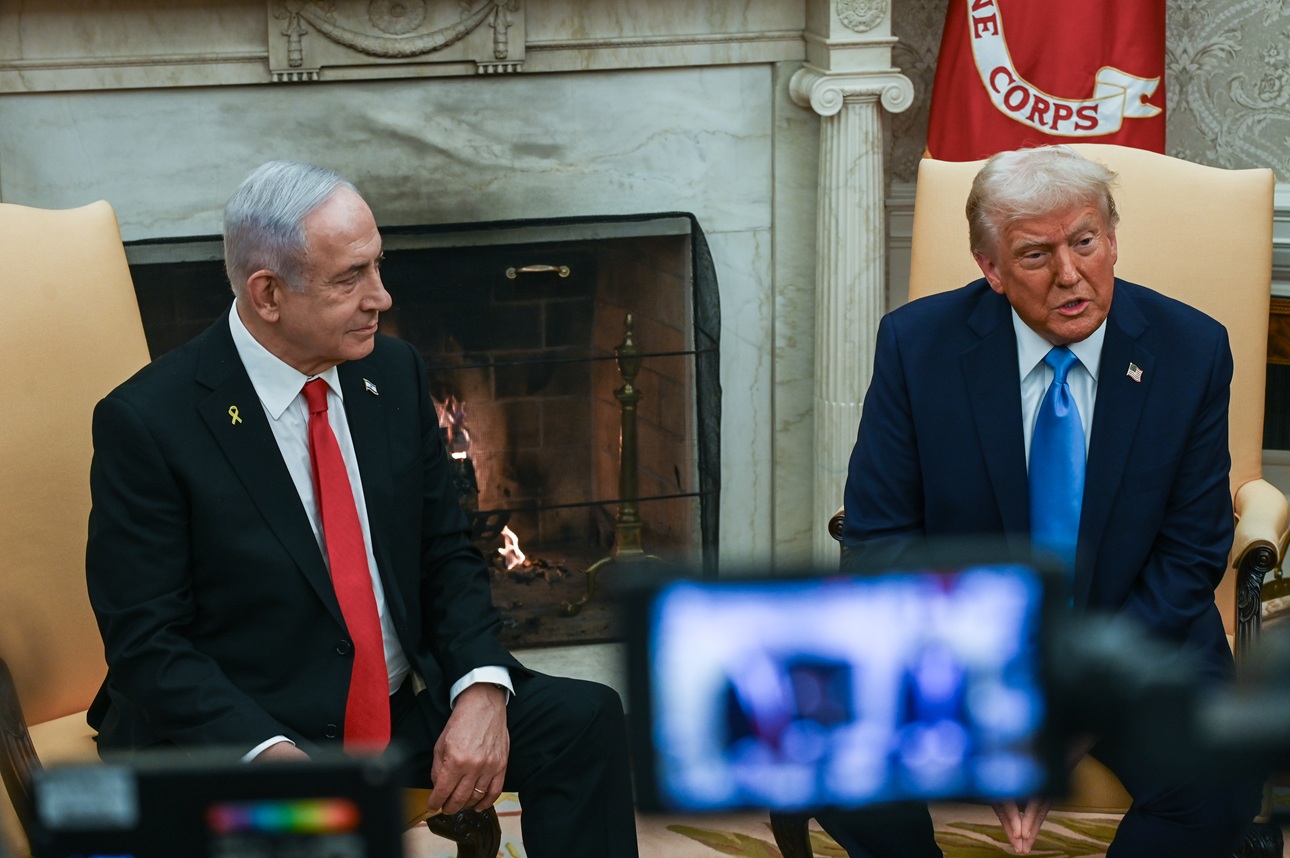
Photo by Liri Agami/Flash90
Methodology
The survey was conducted by the Viterbi Family Center for Public Opinion and Policy Research at the Israel Democracy Institute between June 29 and July 2, 2025. It was based on a representative sample of the population in Israel aged 18 and above, comprising 603 Jewish interviewees and 150 Arab interviewees.
Main Findings
- Across all four indicators of the national mood, this month saw an increase in optimism, with the largest rise found in optimism about the future of Israel’s national security (about half are optimistic this month), and the smallest regarding the future of social cohesion, about which only a quarter (once again) are optimistic this month. The Left is the least optimistic of the three political camps, while the Right is the most optimistic.
- In the wake of Operation Rising Lion, there was an increase in the sense of personal security among Jews (almost half reported a high sense of security this time, compared to just over a third before the war with Iran and about a quarter a year ago). Among Arabs, the situation is the opposite—a drop from about a quarter who reported a high sense of security before the war with Iran to just 14% afterward.
- The goals of the war with Iran: A majority of Jews think that Israel has achieved most or all of its goals, while only 37% of Arabs concur. On the Left, a majority think that Israel has achieved few of its goals or none at all; by contrast, about half of those in the Center and a majority of those on the Right believe that most or all of Israel’s goals have been attained.
- Media consumption during Operation Rising Lion: The survey data show that, as after October 7, the main source of information about the war, both for the Jewish public and for the Arab public, was television news. The print press appears to have been a very negligible source of news information during this period.
- Protective structures: About a third of Arabs report that they have no protective structure nearby, compared to only 5.5% of Jews. In the same context, a very large majority of Arabs support diverting government budgets to improve the provision of protective structures in Arab communities. Among Jews, however, opinions are divided on this proposal: just under half support it, while a slightly lower percentage oppose it. On the Left and in the Center, there is a high level support for redirecting budgets for this purpose, while on the Right, the level of support is low.
- In the Jewish public, the largest share of respondents (close to half), though not a majority, think that the likelihood of reaching an agreement for the end of the war in Gaza and the release of all the hostages is fairly high or very high. In the Arab public, the picture is reversed: the largest share think that the likelihood of reaching such an agreement is fairly low or very low.
- Regarding the likelihood of reaching a regional peace agreement, the Left is more pessimistic than the other two camps, with only a minority in this camp who think the likelihood of such a development is high, compared to about half in the Center and a majority on the Right.
- President Trump: At the beginning of Operation Rising Lion, there was a significant increase in the share of Jews who think that Israel’s security is a central consideration for Trump. After the American attack on Iran’s nuclear facilities, this share remained stable and did not rise further.
- The Israeli public is divided on the question of when elections should be held: 47% prefer that the elections be held when originally scheduled (November 2026), while 42.5% prefer elections as soon as possible. However, among Jews, a small majority prefer that the elections be held on their original date, while the situation is the opposite among Arabs—a small majority think that elections should be held as soon as possible.
As every month, we once again examined the rates of optimism about the future in four areas: Israel’s national security, democratic rule, the economy, and social cohesion. For all four, we found an increase this month in the share of optimists, but the order between them remained the same. The highest rate of optimism was found regarding security, with a sharp increase from 37% last month to 51% this month, apparently due to the positive assessments of Operation Rising Lion. In second place is the share of those who are optimistic about the future of democratic rule, which also saw a significant rise (from 37% in May to 47% in June). The share of optimists about the state of the economy, which is the third largest, increased from 27% last month to 34% this month, while the smallest share of optimists—about cohesion in Israeli society—increased slightly (from 24% to 26%).
Overall, these indicators would seem to indicate a certain recovery in the national mood, while the issue that most worries the public remains the lack of national cohesion.
Optimistic about the future (total sample; %)
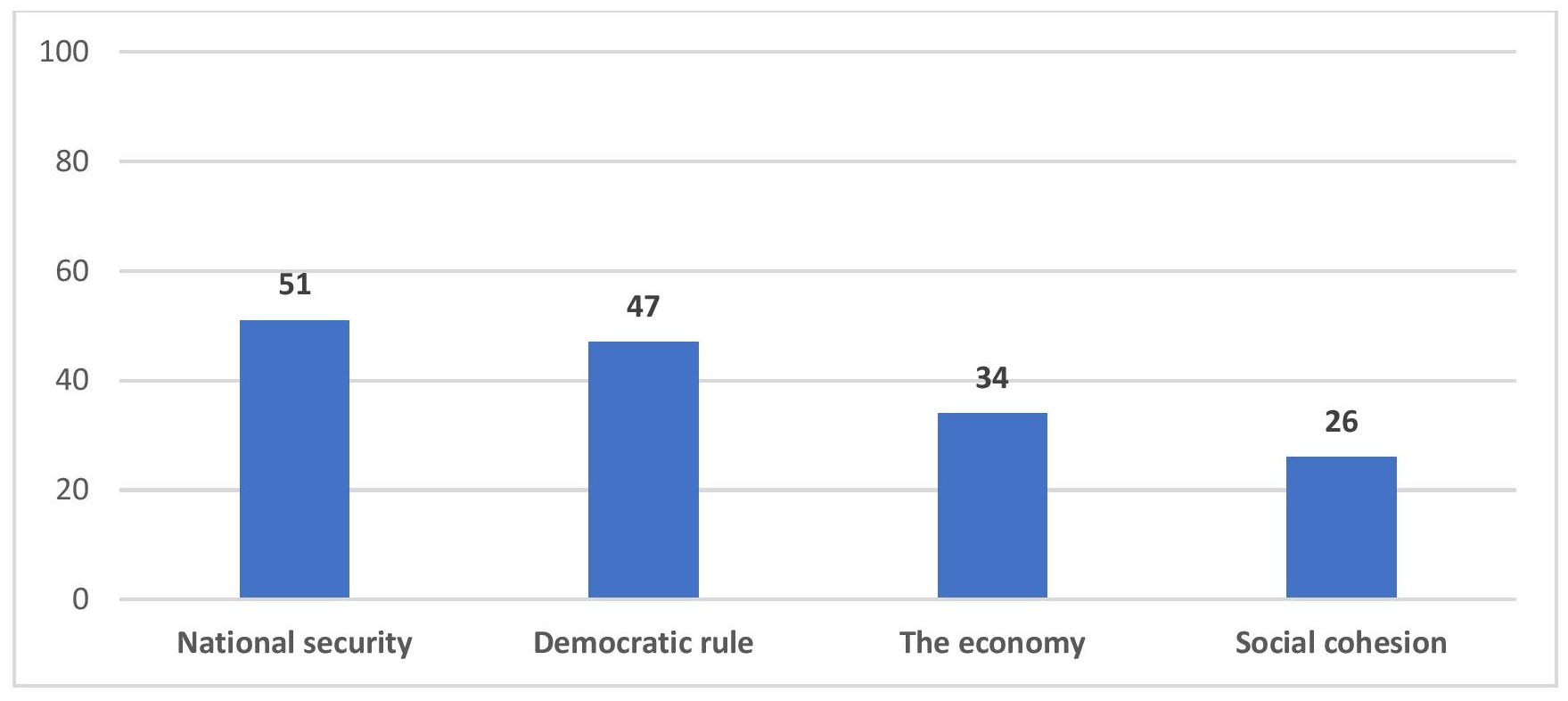
Optimistic about the future of democratic rule in Israel and about the future of national security (total sample; %)
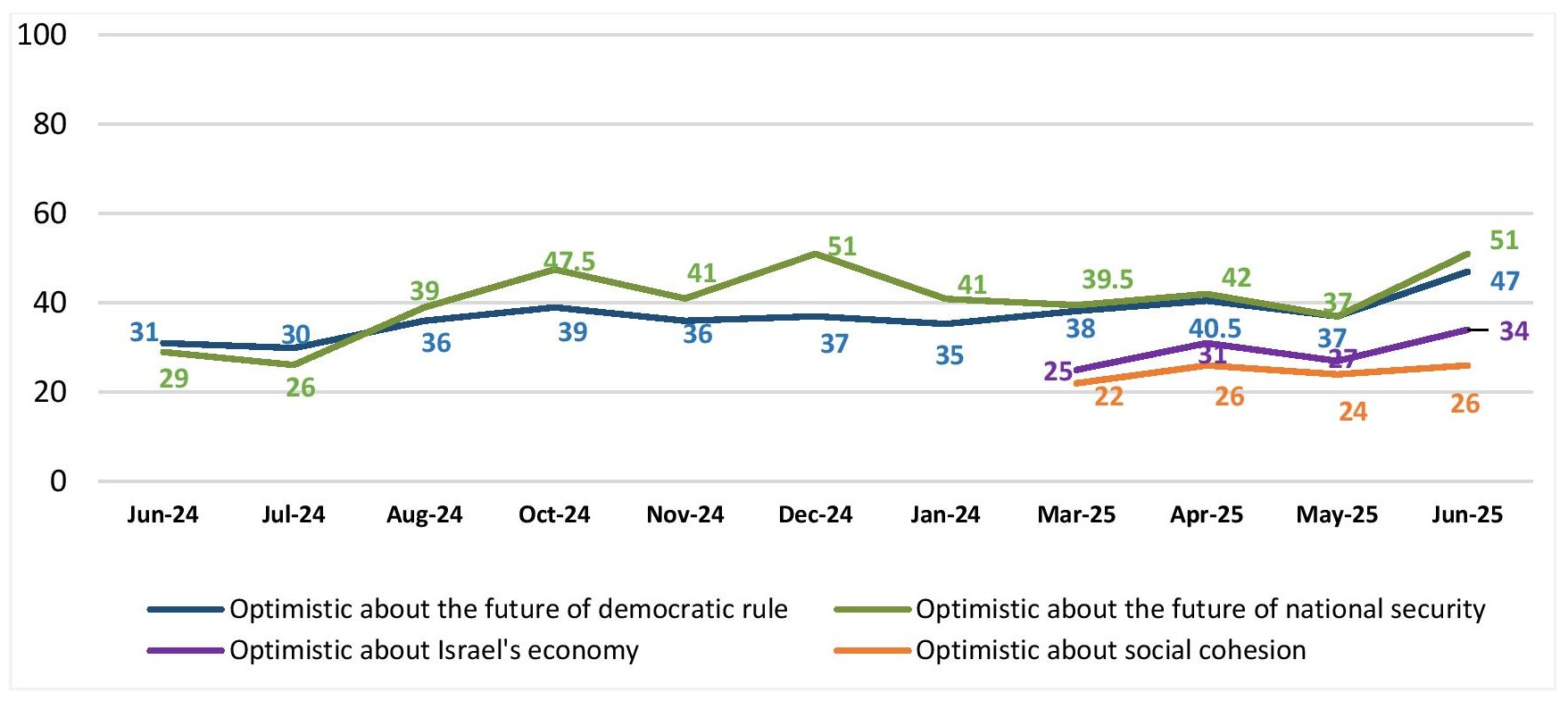
Breaking down responses in the Jewish sample by political orientation reveals significant differences, though the relative ranking of the rates of optimism is the same. In every area, the share of optimists on the Left is not only the smallest of all three camps, but also represents a minority. The share of optimists on the Right is the largest in all areas, with a large majority optimistic about the future of national security and the future of democratic rule and just under half optimistic about the future of the economy; only when it comes to the future of social cohesion do optimists on the Right constitute a minority. In all areas, rates of optimism in the Center are higher than on the Left, but lower than on the Right.
Optimistic about the future (Jews, by political orientation; %)
Once again, we asked the public about their sense of personal security, as we did a month ago (before Operation Rising Lion), and before that, in May 2024, seven months into the Iron Swords war and before the military successes against Hezbollah in Lebanon. In line with the rise we found in optimism about national security, there has also been a clear increase in the sense of personal security in the Jewish public: This month, 46% reported a high sense of security, compared to 37% a month ago and only 26% a year ago. However, among Arabs, the trend is the opposite, with a decline from 24% who reported a high sense of personal security in May to 14% in June, representing a return to the low share of Arabs who felt safe a year ago. The differences between the populations may stem from poor protection against Iranian missiles in Arab communities compared to Jewish communities. Another possibility is that the sense of personal security in the Arab public is also greatly affected by the issue of violent crime, perhaps even more than by external threats to the state.
Sense of personal security (%)
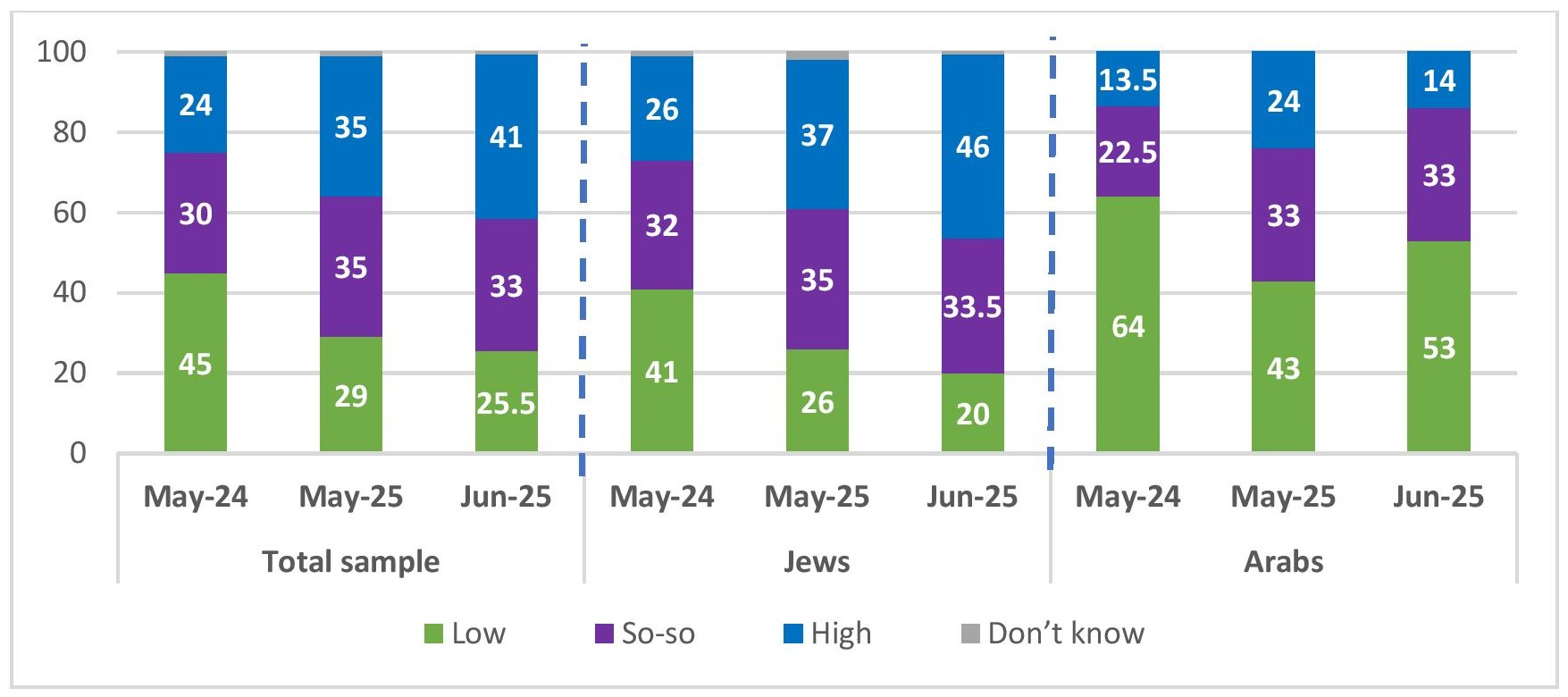
Breaking down responses in the Jewish sample by political orientation, we found a significant improvement in the sense of personal security on both the Left and the Right. On the Left, the rise was particularly acute, with the share of those reporting a high sense of personal security almost doubling, from 18.5% last month to 32% in June. On the Right, the share of those with a high sense of personal security rose by 11 percentage points from last month, while the share of those with a low sense of personal security fell by 5 points. In the Center, the picture is more complex: While the share of those who report a low sense of security has declined (from 32% to 25%) and the share of those who rate it as “so-so” has increased (from 38% to 43%), the share of reporting a high sense of security has remained almost unchanged (at 31%, compared to 29% last month).
Sense of personal security (Jews, by political orientation; %)
We asked: “In your opinion, did Israel achieve its goals in the war against Iran?” We found large differences between Jews and Arabs: A majority of Jews (60%) think that Israel achieved most or all of the goals it set for itself, while only a minority of Arabs (37%) concur.
Breaking down responses in the Jewish sample by political orientation reveals that a majority on the Left (59%) think that Israel achieved few or none of its goals. By contrast, in the Center, just over half think that Israel achieved most or all of its goals, a view held by more than two-thirds of those on the Right. It is worth noting that a small percentage in all three camps think that Israel achieved all its goals.
In your opinion, did Israel achieve its goals in the war against Iran? (Jews; %)
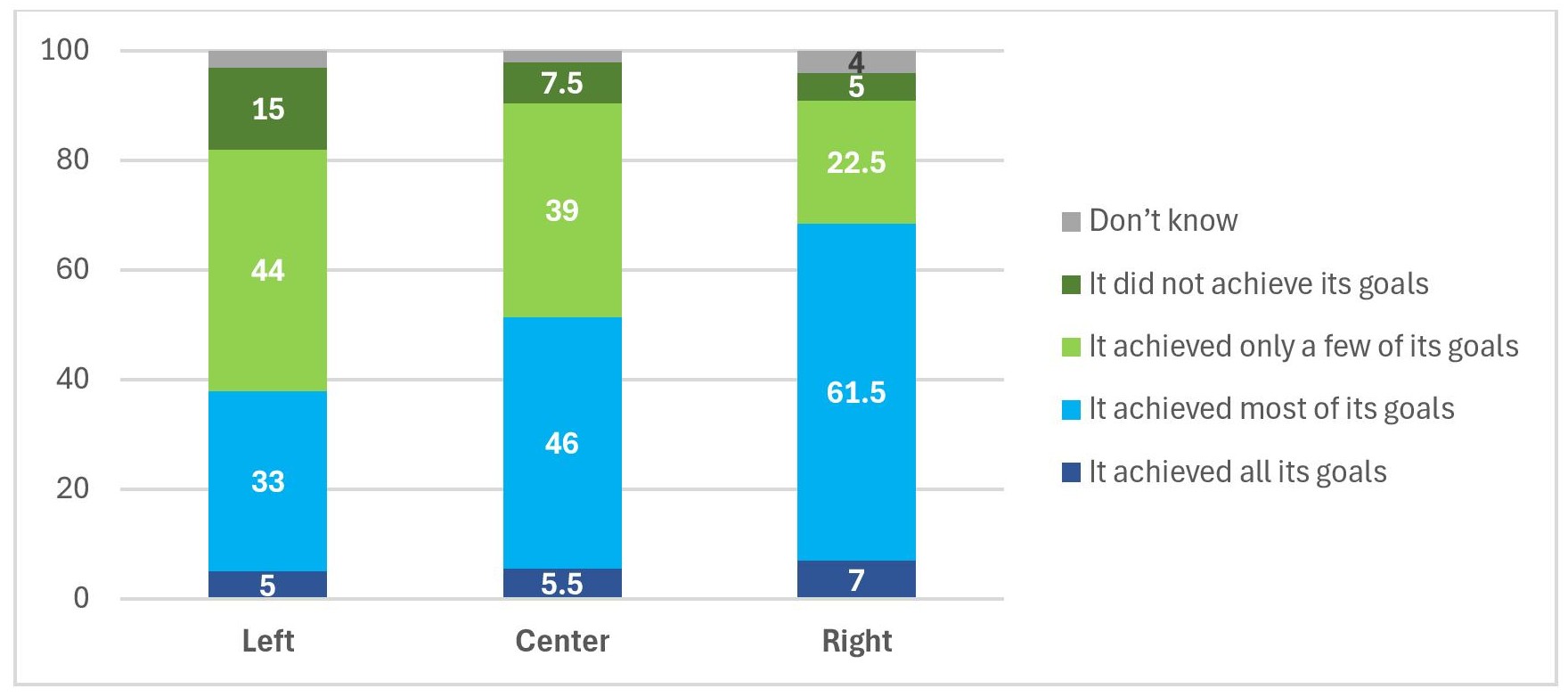
We were interested in where Israel’s citizens got their information about what was happening during Operation Rising Lion. We asked respondents about the news sources that they used during the war with Iran, and found that television provided the largest shares of Jews and Arabs with most of their news about the war. The negligible role played by radio and the print press clearly demonstrates the enormous changes that have taken place in recent years in media consumption, for good and for bad, though the prominence of television is not a new phenomenon.
Interestingly, Arab respondents reported almost no reliance on printed newspapers, but were much more reliant than Jews on social media, and slightly more reliant on television (since we did not ask respondents about specific channels, we don’t know whether the channels watched by Arabs were similar or different from those watched by Jews).
Main sources of news during Operation Rising Lion (%)
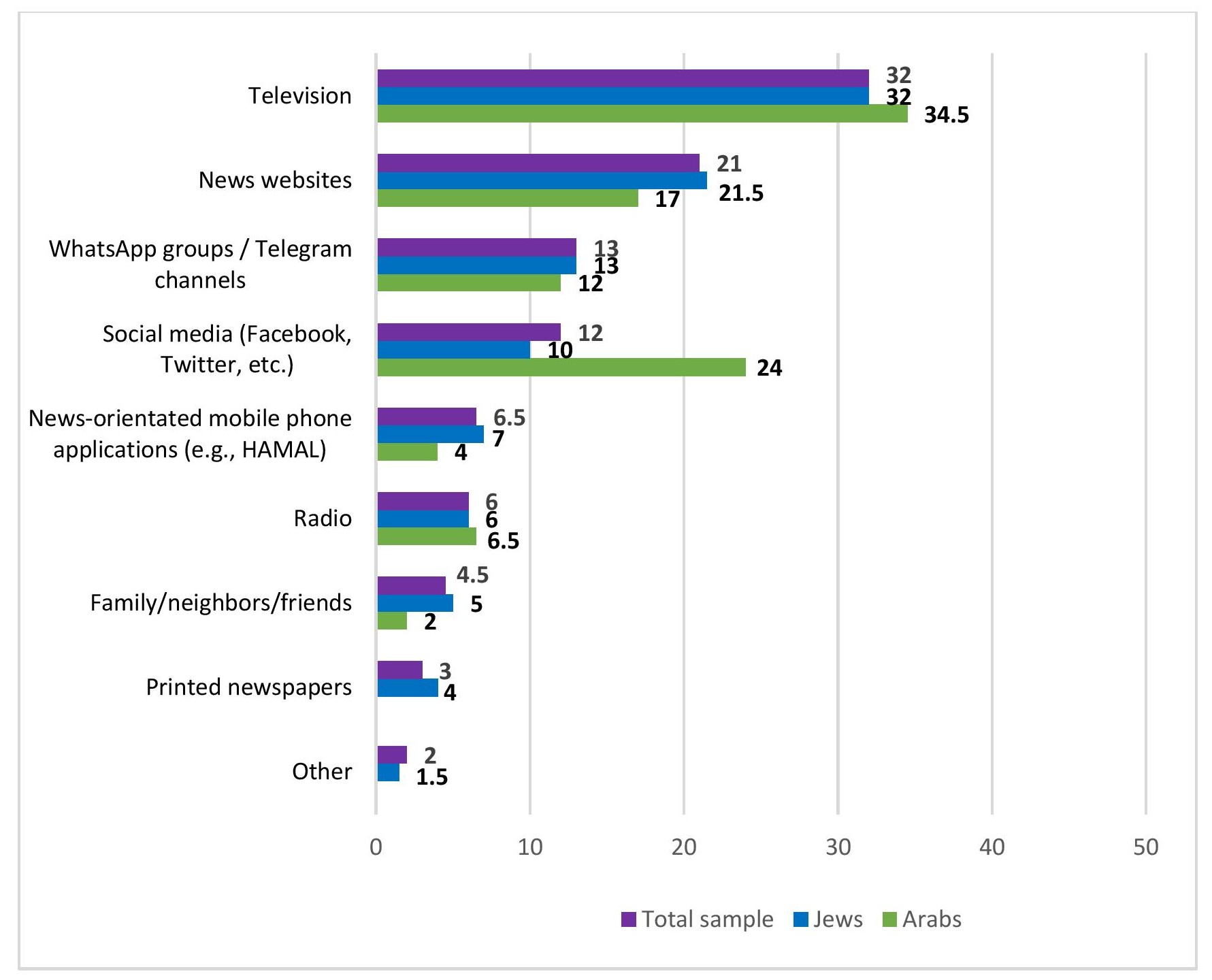
We asked our respondents about their access to protective structures, and the type of protective structures available to them. We found significant differences between Jews and Arabs: About one-third of Arabs say they do not have any proper protective structure in their home or nearby, compared to just 5.5% of Jews.
Among Jews, there is greater availability of some kind of protective structure: The majority report that they have a safe room (mamad) in their home, about a quarter have a communal safe room or shelter in their building, and around 10% have a public shelter nearby. Among Arabs, only around 40% say they have a safe room, 17% have a communal safe room or shelter in their building, and 11% have a public shelter nearby.
Availability of protective structures (%)
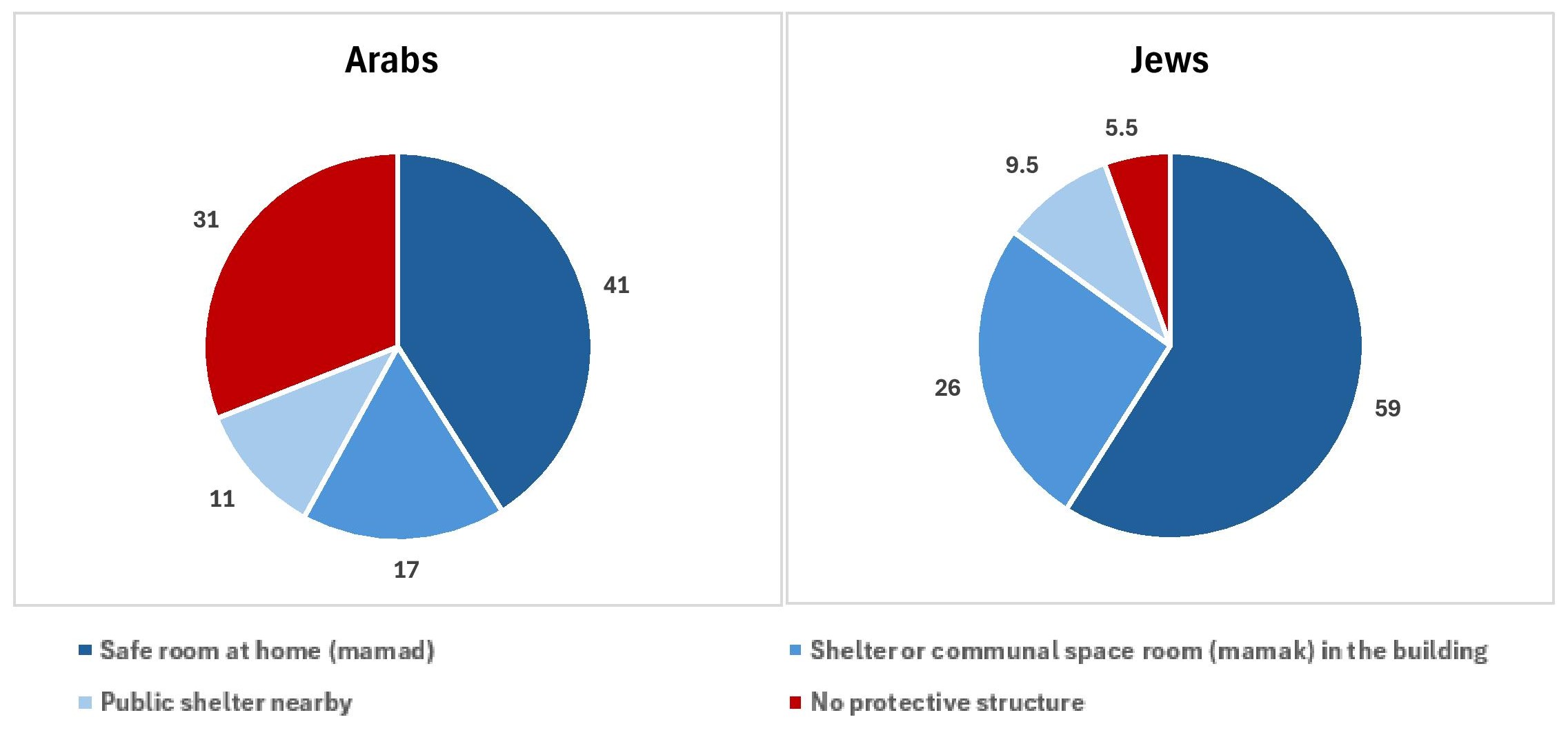
Surprisingly, we found no connection between availability and type of protective structure and the sense of personal security. Among Jews, the shares of those with a high sense of personal security are similar among all groups, and paradoxically, but similar to our previous survey in May 2024, the smallest share of these (45%) was recorded among those who have a safe room at home, compared to those who have a communal safe room or shelter in their building (47.5%), those who have a public shelter nearby (47.5%), and even those who do not have a shelter at all (53%). Among Arabs, too, we found no consistent pattern of association between the availability of a protective structure and the sense of personal security. It would appear that sense of personal security is influenced by other factors, such as assessment of the likelihood of another war in the future, or the degree of exposure to violent crime in one’s area of residence.
Given the lack of access to protective structures in Arab communities, we asked: “In light of the lessons from Operation Rising Lion, should the state divert budgets away from other issues in order to improve the provision of protective structures in Arab localities?” A large majority of Arabs (81%) think or are certain that the state should do so. Among Jews, the largest share of respondents think or are certain that it should (46%), but a considerable share (41%) think or are certain that it should not. When we asked a similar question in November 2024, the findings were also similar: 88.5% of Arabs said that more resources should be invested in protective structures in Arab communities, as did 44.5% of Jews (45.5% disagreed). In other words, there were no significant changes between November 2024 and June 2025, despite the events of Operation Rising Lion.
Breaking down responses in the Jewish sample by political orientation reveals that the level of support for diverting budgets to provide protective structures in Arab localities is particularly high on the Left and stands at close to two-thirds in the Center. On the Right, by contrast, more than half are opposed to such a course of action, while only a third are in favor.
There is less provision of protective structures in Arab localities than in Jewish localities. In your opinion, in light of the lessons from Operation Rising Lion, should the state divert budgets away from other issues in order to improve the provision of protective structures in Arab localities? (%)
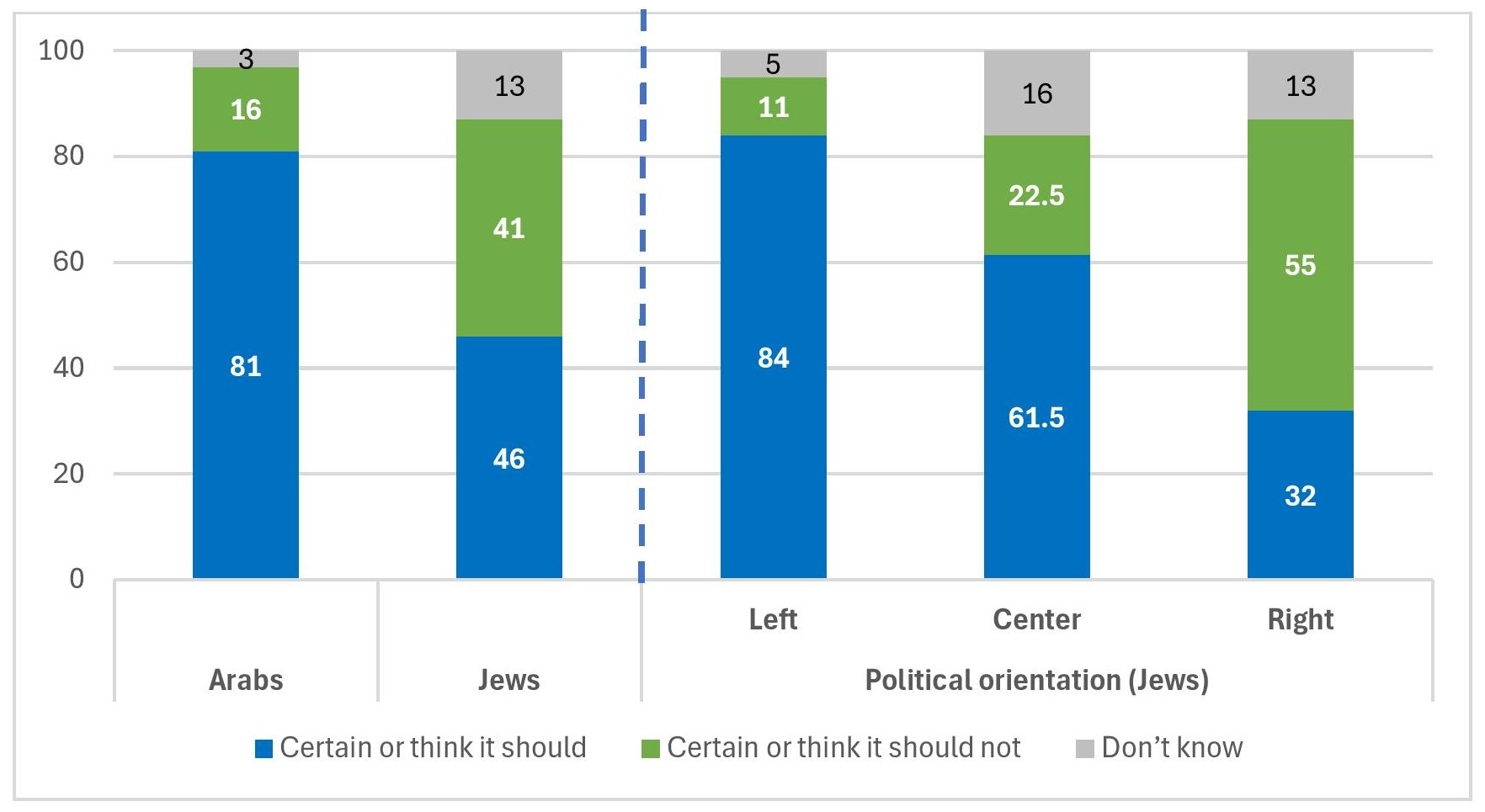
We asked: “Following the end of the war with Iran, what is the likelihood that an agreement will also be reached for the end of the war in Gaza and the release all the hostages?” Opinions are divided among both Jews and Arabs, but among Jews, the largest share (50%) think the likelihood of this happening is fairly or very high (39% consider it to be fairly or very low). By contrast, the largest share of Arab respondents (49%) think that the likelihood of this development is fairly or very low, while 43% think it is fairly or very high.
Following the end of the war with Iran, what is the likelihood that an agreement will also be reached for the end of the war in Gaza and the release of all the hostages? (%)
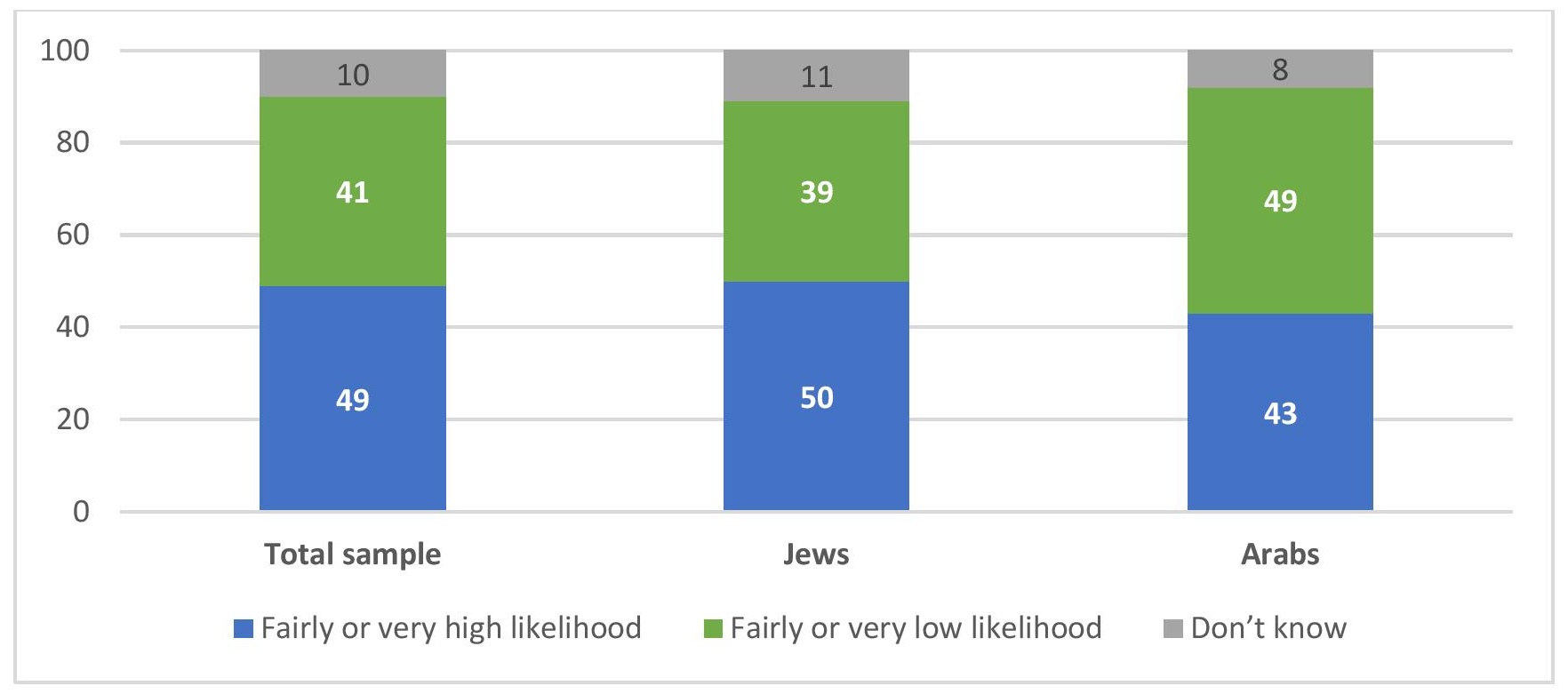
Breaking down responses in the Jewish sample by political orientation, we found that on the Left, the share who rate the likelihood of reaching an agreement as low is larger than the share who rate it as high. The Center is almost equally divided, while on the Right, a sizable majority think that the likelihood of an agreement is high.
Following the end of the war with Iran, what is the likelihood that an agreement will also be reached for the end of the war in Gaza and the release of all the hostages? (Jews, by political orientation; %)
In a similar vein, we asked: “And in your opinion, following the end of the war with Iran, what is the likelihood that a regional process will begin aimed at achieving peace in the Middle East?” The distribution of responses was very similar—indeed, almost identical—to that for the previous question: Public opinion is divided, but among Jewish respondents, the largest share consider the likelihood of such an agreement to be fairly or very high, while among Arab respondents, the opposite holds true (though in this case, the difference between the two opinions is very small).
Following the end of the war with Iran, what is the likelihood that a regional process will begin aimed at achieving peace in the Middle East? (%)
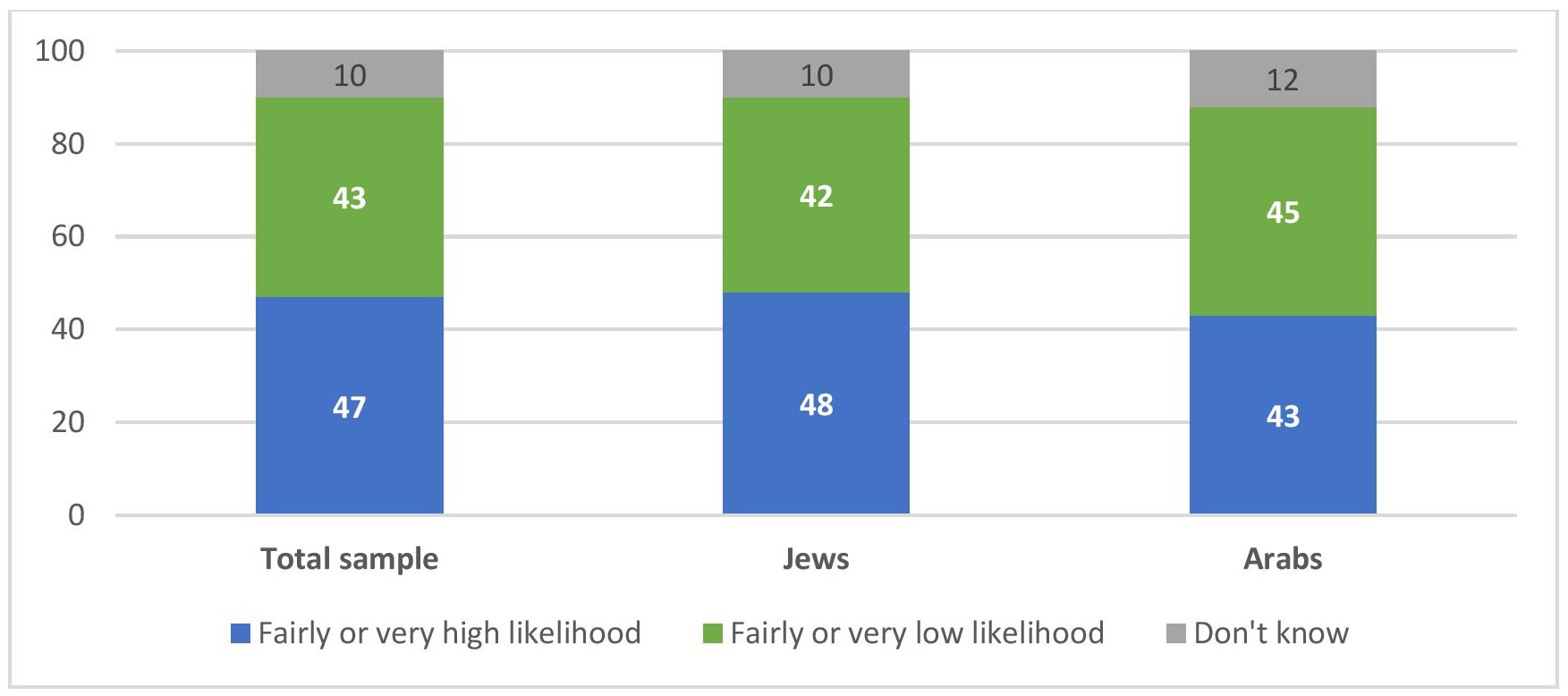
A breakdown of responses in the Jewish sample by political orientation also yielded different results: On the Left, a majority think that the likelihood of achieving a regional peace agreement are fairly or very low (59%); in the Center, a larger share of respondents consider the likelihood of a regional peace agreement to be fairly or very high than rate it as fairly or very low (46% versus 40%); and on the Right, a small majority rate the likelihood of a regional peace agreement as fairly or very high (54% versus 39%).
Following the end of the war with Iran, what is the likelihood that a regional process will begin aimed at achieving peace in the Middle East? (Jews, by political orientation; %)
Since President Trump was elected for a second term, we have asked our respondents on several occasions whether they think that Israel’s security is a central consideration in his policymaking: in November 2024, after his election victory; in April and in May 2025, against the backdrop of the nuclear talks with Iran; in a flash survey on June 25, a few days after the launch of Operation Rising Lion but before the American attack on Iran’s nuclear facilities; and now, after the end of the war with Iran.
Among Arabs, we have seen a degree of volatility: the share who think that Israel’s security is a central consideration for Trump dropped from around 60% after his election victory to around 40% against the backdrop of the nuclear talks with Iran. Next, it climbed back sharply to 66%, and then dropped significantly at the beginning of Operation Rising Lion, possibly due to the delay in American military support for Israel. And now, this share has risen to more than 70%—the highest level measured so far.
Among Jews, the picture is different: The optimism following Trump’s election victory—when some two-thirds thought that Israel’s security was a central consideration for the president—was followed by a 20-percentage-point drop against the backdrop of the nuclear talks with Iran. At the beginning of the war with Iran, this share increased significantly to 60%, but surprisingly, after the American attack on Iran’s nuclear facilities, it remained stable and did not rise further.
Think that the security of Israel is, to a large extent, one of President Trump’s central considerations (%)
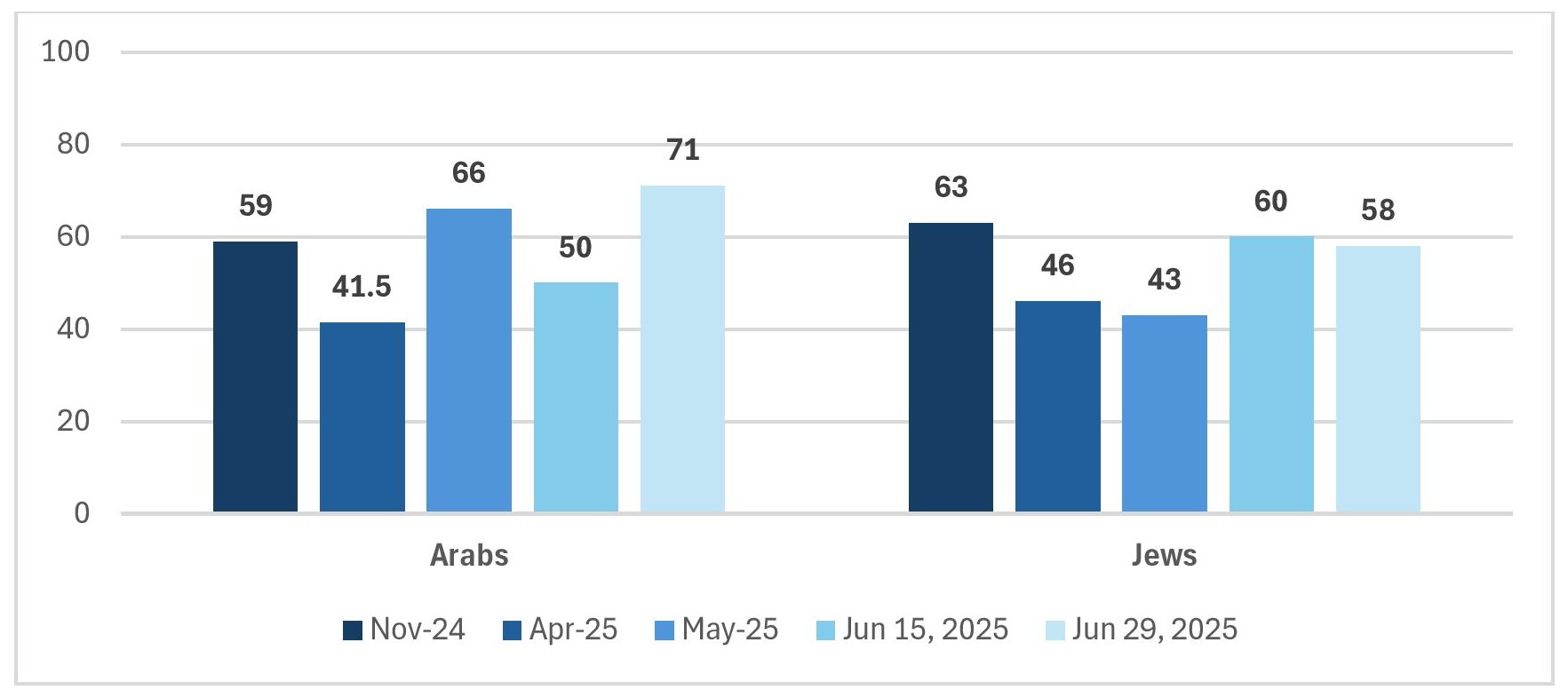
Breaking down responses in the Jewish sample by political orientation reveals a sharp decline on the Right between November 2024 and May 2025 (from 77% to 45%), and then a significant increase during and after Operation Rising Lion (up to 66%). In the Center, there was a more moderate decline between November 2024 and April 2025 (from 46.5% to 36%), followed by an increase in May that became more marked during and after the war with Iran. On the Left, on the other hand, the share who think that Israel’s security is one of Trump’s central considerations has steadily declined throughout this period, from 38% in November 2024 to 24% at the end of June 2025.
Think that the security of Israel is, to a large extent, one of President Trump’s central considerations (Jews; %)
Recently, there has been much discussion about the likelihood of early elections. We asked: “When should the next Knesset elections be held?” We offered respondents just two options: as soon as possible, in accordance with the provisions stipulated in law (within about three months); or as originally scheduled, in November 2026. We found a divided public, with a slightly larger share preferring elections to be held on their original date.
In your opinion, when should the next Knesset elections be held? (total sample; %)
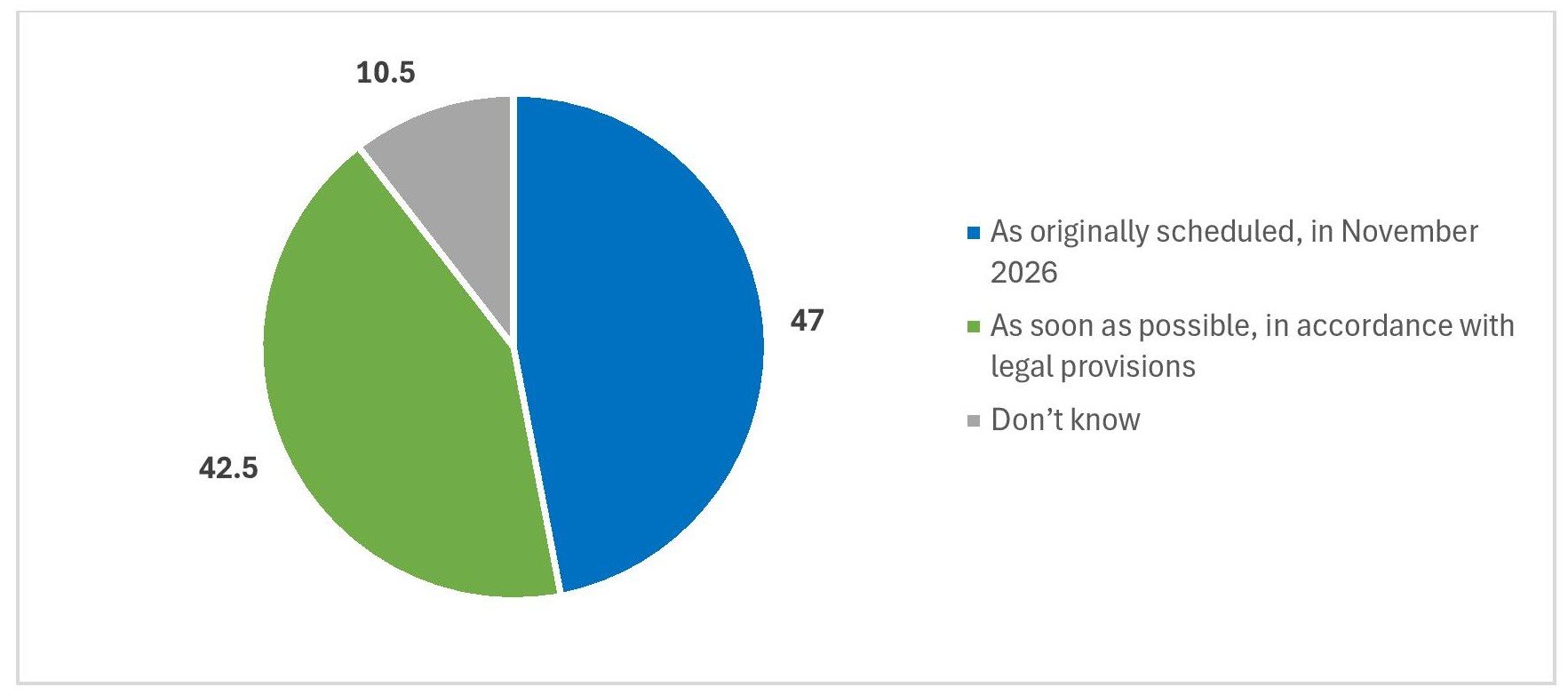
Among Jews, 53% prefer that elections be held on their original date, while among Arabs, the situation is reversed: 57% think that elections should be held as soon as possible.
Breaking down responses in the Jewish sample by political orientation reveals that the majority of those on the Left and in the Center would prefer holding elections as soon as possible (81% and 59% respectively), while on the Right, 70% prefer that the elections be held as originally scheduled.
A breakdown by voting in the 2022 elections shows that among voters for coalition parties, as expected, a large majority of between 75% and 80.5% prefer that the elections be held on their original date, while the picture is reversed among voters for opposition parties, with between 64.5% and 80% preferring that elections be held as soon as possible.
In your opinion, when should the next Knesset elections be held? (total sample, by vote in the 2022 elections; %)
The June 2025 Israeli Voice Index was prepared by the Viterbi Family Center for Public Opinion and Policy Research at the Israel Democracy Institute. The survey was conducted via the internet and by telephone (to include groups that are under-represented on the internet) between June 29 and July 2, 2025, with 603 men and women interviewed in Hebrew and 150 in Arabic, constituting a nationally representative sample of the adult population in Israel aged 18 and over. The maximum sampling error was ±3.57% at a confidence level of 95%. Field work was carried out by Shiluv I2R. The full data file can be found at: https://dataisrael.idi.org.il.
